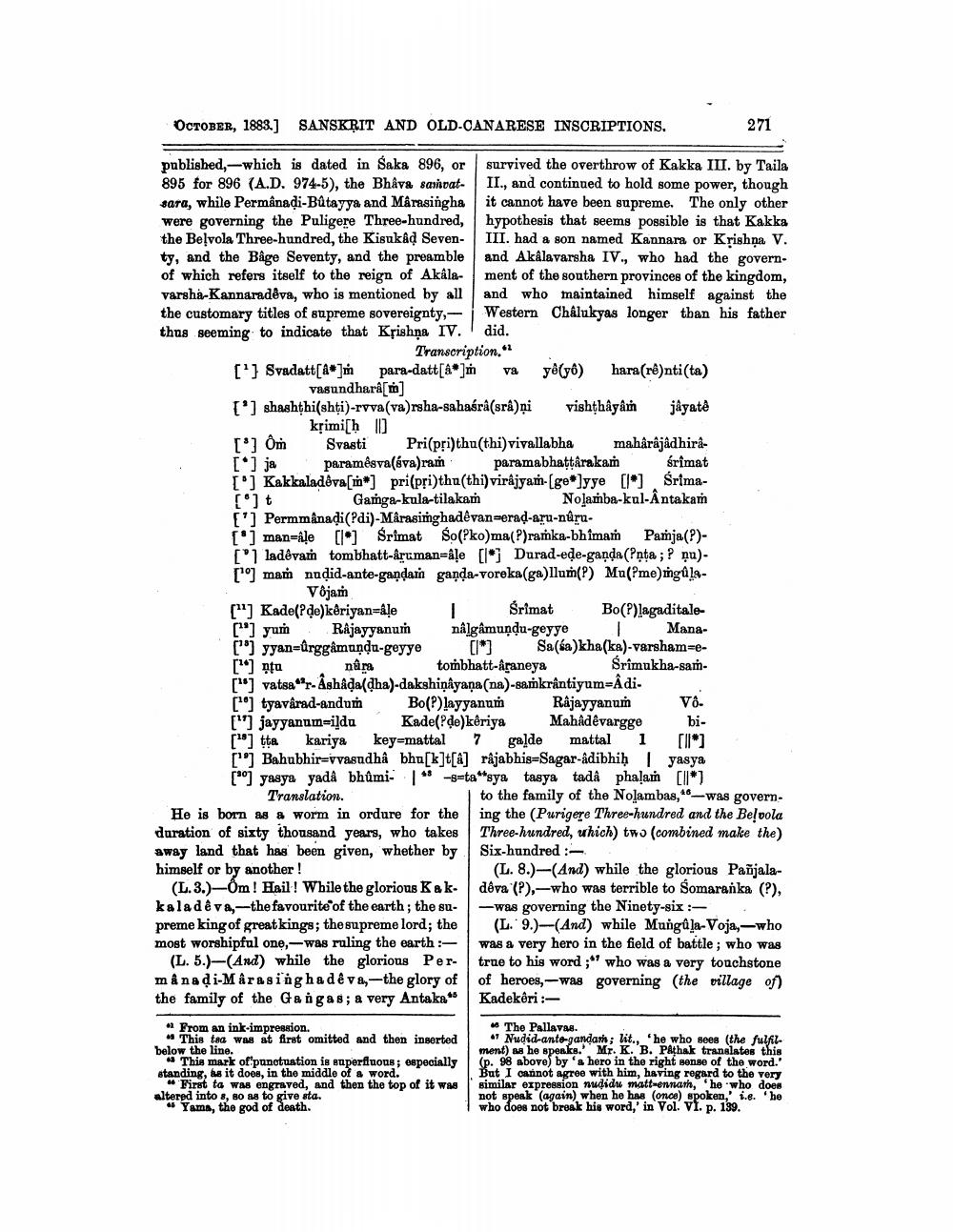________________
OCTOBER, 1883.] SANSKRIT AND OLD-CANARESE INSCRIPTIONS.
published,-which is dated in Saka 896, or 895 for 896 (A.D. 974-5), the Bhava samvatsara, while Permânaḍi-Bûtayya and Mârasingha were governing the Puligere Three-hundred, the Belvola Three-hundred, the Kisukâd Seventy, and the Bâge Seventy, and the preamble of which refers itself to the reign of Akâlavarsha-Kannaradêva, who is mentioned by all the customary titles of supreme sovereignty, thus seeming to indicate that Krishna IV.
Transcription."
[] Svadatt[4]m para-datt[â*]m va yê(yo) hara(re)nti(ta)
vasundharâ[m]
[*] shaahthi(shti)-rvva(va)raha-sahari(sr)gi
vishthiyam jkystė
krimi b
[*] On Svasti Pri(pritha(thi)vivallabha mahirijidhiri
paramabhaṭṭarakam
śrîmat
[*] ja paramava(va)rach [*] Kakkaladva[th] pri(pri)thn(thi) virkiyam (gelyye [1] Srima[*] t Gamga-kula-tilakam Nojaba-kul-Antakaṁh ['] Permmanadi(Pdi)-Marsainghadevan-rad-aro-aku[] man-âle [1] Srimat So(Pko)ma(?)ramka-bhimam Pamja(?)[] ladêvam tombhatt-âruman-âle [*] Durad-ede-ganda (Pnta; ? nu)["manndid-ante-gapdan gapja-voreka(ga)llum(?) Mu(?me)hgū
Vijam [] Kade(de)kêriyan
I Śrimat (") yம் Rajayyanumh nälgimundu-geyye [1]yyan-ûrggâmundu-geyye
[*]咖
survived the overthrow of Kakka III. by Taila II., and continued to hold some power, though it cannot have been supreme. The only other hypothesis that seems possible is that Kakka III. had a son named Kannara or Krishna V. and Akalavarsha IV., who had the government of the southern provinces of the kingdom, and who maintained himself against the Western Châlukyas longer than his father did.
tombhatt-âraneya
He is born as a worm in ordure for the duration of sixty thousand years, who takes away land that has been given, whether by himself or by another!
(L. 3.)-Om! Hail! While the glorious Kakkaladeva, the favourite of the earth; the supreme king of great kings; the supreme lord; the most worshipful one,-was ruling the earth :
(L. 5.)-(And) while the glorious Permânaḍi-Marasinghadêva,-the glory of the family of the Gangas; a very Antaka
[ין]
nura
["vat"-Ashida(dha)-dakshiṇāyaṇa (na)-sahkrintiyum-Adi
From an ink-impression.
This tea was at first omitted and then inserted below the line.
Mana
Bo(P)JagaditaleI Sa(sa)kha(ka)-varsham-eSrimukha-sam
This mark of punctuation is superfluous; especially standing, as it does, in the middle of a word. "First ta was engraved, and then the top of it was altered into 8, so as to give sta.
5 Yama, the god of death.
Vô
[] tyavid-anduth Bo(?)Jayyanush Rajayyanum ["]jayyanum-du Kade(?ḍe)kêriya Mahidevanggo bi[18] tṭa kariya key=mattal 7 galde mattal 1 [*] [1] Bahubhir-vvasudha bhu[k]t[â] râjabhis-Sagar-âdibhiḥ | yasya [] yasya yada bhûmi- |-s-ta**sya tasya tadâ phalam [*] Translation. to the family of the Nolambas, was governing the (Purigere Three-hundred and the Belvola Three-hundred, which) two (combined make the) Six-hundred :
46
271
(L. 8.)-(And) while the glorious Pañjaladêva (?),-who was terrible to Somaranka (?), -was governing the Ninety-six :
(L. 9.)-(And) while Mungûla-Voja,-who was a very hero in the field of battle; who was true to his word;" who was a very touchstone of heroes,-was governing (the village of) Kadekêri:
The Pallavas.
47 Nudid-ante-gandam; lit., he who sees (the fulfil ment) as he speaks. Mr. K. B. Pathak translates this (p. 98 above) by 'a hero in the right sense of the word." But I cannot agree with him, having regard to the very similar expression nudidu matt-ennam, he who does not speak (again) when he has (once) spoken,' i.e. he who does not break his word,' in Vol. VI. p. 139.




